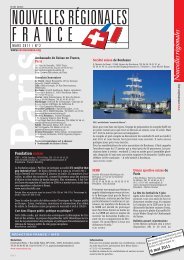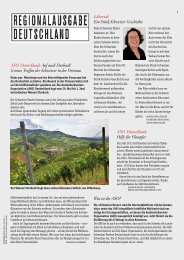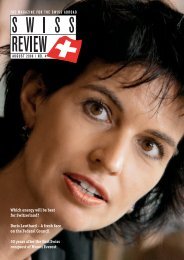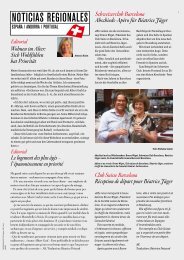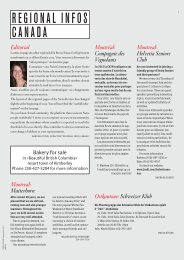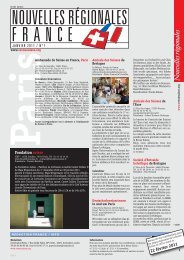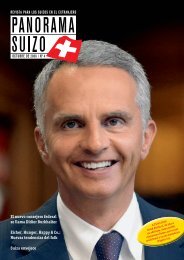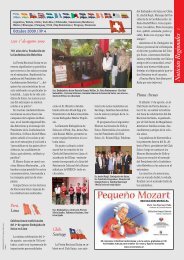Download PDF Swiss Review 1/2013 High Resolution
Download PDF Swiss Review 1/2013 High Resolution
Download PDF Swiss Review 1/2013 High Resolution
You also want an ePaper? Increase the reach of your titles
YUMPU automatically turns print PDFs into web optimized ePapers that Google loves.
9<br />
<strong>Swiss</strong> <strong>Review</strong> February <strong>2013</strong> / No. 1<br />
Photo: Keystone<br />
age and gender are taken into account, not<br />
their state of health. As a result, competition<br />
between the health insurance funds is<br />
primarily limited to going after the “good<br />
risks” – the young and healthy. That does<br />
not generate savings for anyone. On the<br />
contrary, every change of insurance fund<br />
produces costs, and the money for advertising<br />
health insurance funds also has to come<br />
from somewhere.<br />
The political gridlock is a consequence of<br />
the many individual interest groups, which<br />
include doctors, the health insurance funds,<br />
the pharmaceutical industry and patients,<br />
to name but a few. In no other policy area<br />
are so many different players involved in<br />
consultation as in healthcare. The two main<br />
interest groups, the health insurance funds<br />
and the doctors, have even had a voice in<br />
Parliament in recent years. The funds have<br />
been represented in the Council of States<br />
in the form of Christoffel Brändli (SVP)<br />
from Grisons as president of the health insurers’<br />
association Santésuisse and Eugen<br />
David (CVP) from St. Gallen as president<br />
of Switzerland’s largest health insurance<br />
fund, Helsana. The president of the <strong>Swiss</strong><br />
Medical Association, Jacques de Haller (SP)<br />
from Geneva, has given the doctors a voice<br />
in the National Council.<br />
Far too few young<br />
doctors want to become<br />
general practitioners<br />
today – the job is stressful<br />
and poorly paid<br />
Shared responsibility<br />
Shared responsibility for the healthcare system<br />
has also proven an obstacle to reform.<br />
Health insurance is a federal issue, while<br />
healthcare provision is a matter for the cantons.<br />
They decide, for example, on hospital<br />
provision. However, only around half the<br />
costs incurred in the hospitals are covered<br />
by the cantons. The remainder is paid for by<br />
health insurance. Shared responsibility has<br />
produced a situation of “muddling through”,<br />
according to observers such as the ethicist<br />
Ruth Baumann-Hölzle from Zurich (see interview).<br />
The verdict of the OECD and<br />
WHO on the <strong>Swiss</strong> decision-making mechanisms<br />
is not quite as harsh. They even consider<br />
the “local flexibility” of the 26 cantons<br />
to be one of the system’s strengths. The role<br />
of direct democracy is also viewed positively:<br />
“The uniquely high degree of direct political<br />
involvement at all levels of government provides<br />
<strong>Swiss</strong> citizens with the opportunity to<br />
have an impact on the direction of healthcare<br />
policy.” Both organisations nevertheless<br />
warn that “differences between the cantons<br />
in terms of funding<br />
and access (...) may mask<br />
disparities”.<br />
Healthcare has<br />
brought little good fortune<br />
for the Federal<br />
Councillors responsible<br />
for it in recent years.<br />
Pascal Couchepin, a volatile<br />
Free Democrat<br />
from Valais, found it difficult<br />
to perform the<br />
task of ensuring a balance<br />
of interests. Neuchâtel’s<br />
Didier Burkhalter,<br />
another Free<br />
Democrat, left the Department<br />
of Home Affairs<br />
after just two years to return to the Department<br />
of Foreign Affairs without really<br />
getting to grips with healthcare policy.<br />
Alain Berset’s first steps<br />
Alain Berset, a Social Democrat from Fribourg,<br />
has now been responsible for the constant<br />
work in progress that is healthcare for<br />
over a year. The Federal Councillor, who is<br />
just 40 years old, is regarded as a quickthinker<br />
and a courageous pragmatist. It is<br />
still too early to assess whether he will be<br />
able to resolve the major issues. The first<br />
projects he has initiated nonetheless appear<br />
to be heading in the right direction. Berset<br />
is finally dealing with the issue of the lack of<br />
general practitioners. Rural regions have<br />
been affected by this for some time. GPs<br />
have for years struggled to find successors<br />
for their practices before entering retirement.<br />
As a result, retirement often means<br />
the closure of the practice.<br />
However, in more recent times, people in<br />
urban areas and regions close to cities can<br />
also consider themselves fortunate to find a<br />
good general practitioner. There are six GPs<br />
for every 10,000 inhabitants on average in<br />
Switzerland. By comparison, there are 16 in<br />
France. Experts say that Switzerland trains<br />
around 400 fewer GPs each year than it actually<br />
needs. The <strong>Swiss</strong> Health Observatory,<br />
a politically neutral organisation, estimates<br />
that Switzerland will be without a third of<br />
the GPs it requires by 2030.<br />
300 more doctors per year<br />
Three hundred extra doctors are now to be<br />
trained each year from the 2018/2019 academic<br />
year onwards. The number of graduates<br />
at Switzerland’s five medical schools<br />
(Zurich, Berne, Basel, Geneva and Lausanne)<br />
is to be increased gradually to 1100 per<br />
academic year by then. Even the establishment<br />
of new medical schools is under discussion.<br />
It is not yet clear who will bear the<br />
costs, amounting to CHF 56 million a year,<br />
for training the extra doctors. The training<br />
of doctors, as with most educational matters,<br />
is in fact the responsibility of the cantons.<br />
However, federal government is also expected<br />
to make a contribution this time.<br />
Only, federal government is hardly likely to<br />
write out a blank cheque for the cantons. If<br />
it is to make a contribution to funding, it<br />
may well also want to have a say.<br />
The training of extra doctors alone does<br />
not resolve the issue, as too few doctors are



